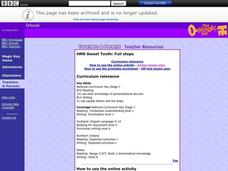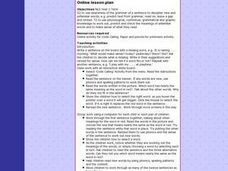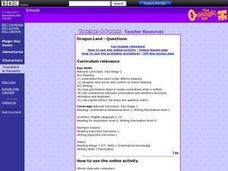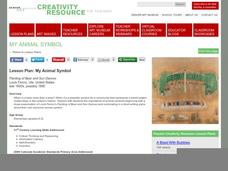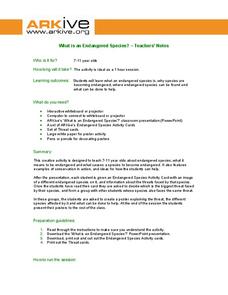iCivics
NewsFeed Defenders
How can people learn to spot viral deception? Players do just that with the NewsFeed Defenders media literacy game. Scholars choose avatars and the focus of their news feeds: student life, health and wellness, or sports and...
BBC
Full Stops
This is an incredibly detailed and thorough plan. It is all about full stops - which is the British way of saying, "Periods." First-year learners practice the skill of knowing when to use a period, and understand what periods are meant...
BBC
Lug and the Giant Stork - Capital Letters
Capital letters are the star of the show in a wonderful language arts lesson. After a teacher-led demonstration and discussion on capital letters, groups of pupils get together and work on the computer to fix the flashing letters that...
BBC
Code Calling - Working Out New Words
Young readers practice deciphering new words by using context clues and grammatical rules. The online activity embedded in the plan is especially engaging, and should be enjoyable for all pupils who work through it. A good printable...
BBC
The Patchworker - Sentences Making Sense
An entertaining and educationally sound lesson on sentence structure is here for you. Young readers play an online game called "The Patchwork Game" where they must patch together a series of words in order to create a complete sentence....
BBC
Sweet Tooth - Full Stops
Young writers engage in a activity which reinforces the concept of when to use periods, "full stops" as they're called, when writing. There is a terrific online activity built into the plan which gives the kids valuable practice, then a...
Curated OER
Dental Detectives
First graders explore the theme of dental health and hygeine. They make tooth loss predictions, count lost teeth, and graph tooth loss. In addition, they listen to dental health stories, read online stories, create spreadsheets, and play...
Curated OER
Dragon Land
Help writers recognize how word order affects meaning, discover new words, and confirm or check meaning writing. They will explore how punctuation helps a reader understand what is written and the connections between punctuation,...
American Institutes for Research
Digital Smiles
Explore metric measurement, recording data, and creating an electronic spreadsheet displaying results with your math class. Scholars will measure the length of their smiles, record the measurements, and represent the results on an...
Curated OER
Affix This
Wait, what am I supposed to affix? Explore the concept of roots/affixes with your class. They use discussion questions to discover the meaning and usage of specific roots and affixes. They watch a video explaining Latin and Greek roots...
Curated OER
Bias and Crime in Media
Critical thinking and social justice are central themes for this resource on bias and crime in media. The class views and discusses an incisive PSA that highlights assumptions based on race. Small groups read newspaper opinion pieces...
Alabama Learning Exchange
Place Value Party
Help your young mathematicians master three-digit place value with a hands-on activity that builds on their social orientation. They create a place value house from construction paper and sort "number friends" according to which house...
ARKive
Galapagos Conservation
The Galapagos Islands inspired Darwin to develop his theory of evolution. These wonderful islands will also be the topic of a lesson on habitat and conservation. In small groups, learners will collect and synthesize information regarding...
Denver Art Museum
My Animal Symbol
Here is an art lesson plan that combines visual arts and language arts into one very nice package. In it, youngsters study a fascinating painting called Painting of Bear and Sun Dances. They begin to understand the importance of...
ARKive
Nocturnal Animals
How do those nocturnal animals see in the dark? This perplexing question does have an answer. First, little ones use their sense of touch to determine the name of a mystery object, then they listen closely to identify various animals by...
ARKive
Animal over Winter
Gosh those polar regions can get cold. So, how do the animals that live there survive the long winters? Learners explore how animals adapted to survive harsh wintry conditions by completing a worksheet and comparing animal survival...
ARKive
What is an Endangered Species?
Even kids in grades two through five can start thinking about the part they play in sustaining endangered species. They consider what endangered species are, how they become endangered, and what conservationists can do to help. In small...
ARKive
Species Discovery
How many of your students know that even today new species are being found all over the globe? Introduce them to the amazing diversity our planet houses with a creative activity about animal variation and classification. They'll use a...
ARKive
Seasons in the Woods
Winter in the cold Northwoods of Wisconsin can be hard on animals that aren't adapted to the climate. Investigate the animals that are out and about even in the coldest winter temperatures as you and your class examine animal...
ARKive
Penguin Diversity – Mask Making
Penguins are very diverse and well-adapted birds; they live on islands, in warm and cold climates. Little ones examine penguin diversity and discuss the highly functional adaptive traits that have helped them survive in some of the...
Curated OER
Inspired Innovation
Throughout time, innovators have taken basic ideas and changed them into creative and cutting-edge designs. Kids tackle the topic of innovations in relation to traditional or creative objects. They discuss traditional Navajo pottery then...
Curated OER
What Kind of Vessel Are You?
This is a strange question; but what kind of vessel would you be and why? After examining images of a large Inca jug, the class sets to writing a creative narrative that answers that very interesting question. They start by researching...
Curated OER
Define Geometry Terms
The Common Core is intended to help all children meet high academic standards. Here is a Common Core designed lesson that is intended for learners with communication or language difficulties. The lesson is written in a narrative style...
ARKive
Adaptations to Arid Habitats
How do plants and animals survive in habitats with very little water? Explore arid ecosystems and the way their inhabitants have adapted with a lesson and science experiment. After kids listen to a presentation about adaptation, they...
Other popular searches
- Esl Interactive Whiteboard
- Interactive Whiteboard Lessons
- Maths Interactive Whiteboard
- Math Interactive Whiteboards



